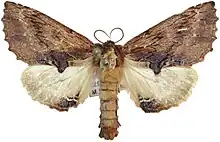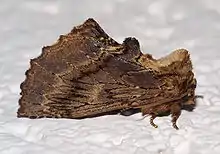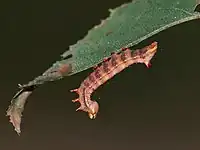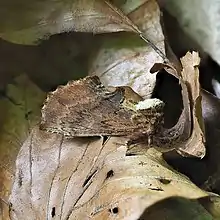| Coxcomb prominent | |
|---|---|
 | |
| P. capucina - Malopolskie, Poland | |
 | |
| Scientific classification | |
| Domain: | Eukaryota |
| Kingdom: | Animalia |
| Phylum: | Arthropoda |
| Class: | Insecta |
| Order: | Lepidoptera |
| Superfamily: | Noctuoidea |
| Family: | Notodontidae |
| Genus: | Ptilodon |
| Species: | P. capucina |
| Binomial name | |
| Ptilodon capucina | |
| Synonyms | |
| |
The coxcomb prominent (Ptilodon capucina) is a moth of the family Notodontidae. It is a common species throughout the Palearctic realm from Ireland to Japan. It was first described by Carl Linnaeus in his 1758 10th edition of Systema Naturae.

This species has brown forewings, varying considerably in tone, with indistinct darker markings. The hindwings are buffish with a black spot at the tornus. At rest, the species has a very distinctive profile with tufts of hairs protruding upwards from the thorax and the hind edge of the forewings (this latter feature shared with other prominents). The margins of the forewings are also wavy. This rather "lumpy" appearance has led to the rather fanciful comparison to the comb on a cock's head. Two broods are produced each year with adults on the wing in May and June and again in August and September. This moth flies at night and is attracted to light.
The larva is green or brown with a yellow stripe down each side and two red humps at the rear end. It is polyphagous and feeds on a wide variety of deciduous trees and shrubs (see list below). The species overwinters as a pupa.
- ^ The flight season refers to the British Isles. This may vary in other parts of the range.


Recorded food plants
For detail see Robinson et al., 2010.[2]
- Acer - Norway maple
- Alnus - alder
- Betula - birch
- Crataegus - hawthorn
- Malus - apple
- Populus - poplar
- Prunus - bird cherry
- Quercus - pedunculate oak
- Rosa - rose
- Salix - willow
- Sorbus - rowan
- Tilia - lime
- Ulmus - European white elm
References
- ↑ Schintlmeister, A. (2013). "Ptilodon Hübner, 1822". World Catalogue of Insects, Volume 11: Notodontidae & Oenosandridae (Lepidoptera). Brill. pp. 363–366. ISBN 978-90-04-25208-0.
- ↑ Robinson, Gaden S.; Ackery, Phillip R.; Kitching, Ian J.; Beccaloni, George W.; Hernández, Luis M. (2010). "Search the database - introduction and help". HOSTS - A Database of the World's Lepidopteran Hostplants. Natural History Museum, London.
- Chinery, Michael (1991). Collins Guide to the Insects of Britain and Western Europe.
- Skinner, Bernard (1984). The Colour Identification Guide to Moths of the British Isles.
Further reading
- South R. (1907) The Moths of the British Isles, (First Series), Frederick Warne & Co. Ltd., London & NY: 359 pp. online as Lophopteryx camelina
External links
- Coxcomb prominent (with photos) on UKMoths
- Savela, Markku. "Ptilodon capucinus (Linnaeus, 1758)". Lepidoptera and Some Other Life Forms. Retrieved August 4, 2019.
- Fauna Europaea
- Lepiforum e.V.